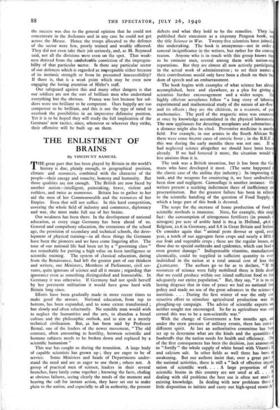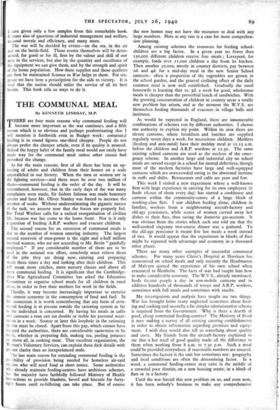THE ENLISTMENT OF BRAINS
By VISCOUNT SAMUEL
THE great part that has been played by Britain in the world's history is due, plainly enough, to geographical position, climate and resources, combined with the character of the people—their energy and tenacity, honesty and humanity. But those qualities are not enough. The British are now faced by another nation—intelligent, painstaking, brave, violent and ruthless, and twice as numerous. Britain has to gather to her aid the men of her Commonwealth and the resources of her Empire. Even that will not suffice. In this hard competition, covering the whole field of industry and commerce, diplomacy and war, she must make full use of her brains.
Our weakness has been there. In the development of national education, at every stage Germany has been ahead of us. General and compulsory education, the extensions of the school age, the provision of secondary and technical schools, the deve- lopment of physical training—in all these things the Germans have been the pioneers and we have come lingering after. The tone of our national life had been set by a "governing class" not remarkable for putting a high value on keen intelligence or scientific training. The system of classical education, dating from the Renaissance, had left the greater part of our thinkers and writers, our Ministers, Members of Parliament, civil ser- vants, quite ignorant of science and all it means ; regarding that ignorance even as something distinguished and honourable. In Germany it was otherwise. If Germany had not spoilt herself by her persistent militarism it would have gone hard with Britain long since.
Efforts have been gradually made in more recent times to make good the arrears. National education, from top to bottom, has been expanded, and to some extent transformed ; but slowly and often reluctantly. No sensible man would wish to neglect the humanities and the arts, to abandon a broad culture and the philosophic outlook, and to aim at a merely technical civilisation. But, as has been said by Professor Bernal, one of the leaders of the newer movement, "The old contrast, often amounting to hostility, between scientific and humane subjects needs to be broken down and replaced by a scientific humanism."
This war has caught us during the transition. A large body of capable scientists has grown up ; they are eager to be of service. Some Ministers and heads of Departments under- stand the need and are as eager to use them ; others not. A group of practical men of science, leaders in their several branches, have lately come together ; knowing the facts, chafing at obvious failures, seeing clearly the needs of the moment and hearing the call for instant action, they have set out to make plain to the nation, and especially to all in authority, the present published their statement as a sixpenny Penguin book, wii the title Science in War. Twenty-five scientists have joined i this undertaking. The book is anonymous—not in order p conceal insignificance in the writers, but rather for the contra/ reason. Anyone who is in touch with this group knows the to be eminent men, several among them with nation-wiii reputations. But they are almost all now actively participatirl in the actual work of administration ; to set their names 1 their contributions would only have been a check on their he dom of speech and an embarrassment.
The book begins with examples of what science has alreadT accomplished, here and elsewhere, as a plea for giving i scientists further encouragement and a wider scope. Oa; highly efficient aeroplanes follow "a long story of laborioa experimental and mathematical study of the nature of air-flows and its effects ; they are the children, in a measure, of put mathematics. The peril of the magnetic mine was countered at once by knowledge accumulated in the physical laboratories The new appliances for detecting aeroplanes and submarines a distance might also be cited. Preventive medicine is anothe field. For example, in our armies in the South African W. there were some 6o,000 cases of enteric fever ; in the B.E.F. : this war during the early months there was not one. If sl- had neglected science altogether we should have been beak: already. If we had fostered it more, the situation would less anxious than it is.
The tank was a British invention, but it has been the Ge. mans who have developed it most. (The same happened .: the classic case of the aniline dye industry.) In improving tlx tank, and the weapons for countering it, we have undoubted, been slow and negligent. Camouflage is another instance. Ole writers present a scathing indictment there of inefficiency an procrastination. But the greatest failure has been in relatia to the scientific handling of the question of Food Supply, a which a large part of this book is devoted.
The scope for the Increase of home production of food 11 scientific methods is immense. Note, for example, this sing fact: the consumption of nitrogenous fertilisers (in pounds d nitrogen) per acre of amble land is 60.4 in Holland, 46.6 it Belgium, 22.6 in Germany, and 8.8 in Great Britain and Ireland. Or consider again that "animal pests devour or spoil, evei! year, a tenth of our aggregate farm crops and nearly a fifth d our fruit and vegetable crops ; these are the regular losses, MI those due to special outbreaks and epidemics, which can lead a even greater damage." Indispensable vitamins, manufactured chemically, could be supplied in sufficient quantity to even individual in the nation at a total annual cost of less thad £2,000,000. The authors go so far as to declare, "If tli resources of science were fully mobilised there is little douti that we could produce within our island sufficient food to feed adequately our entire population." But, they say, "it is to oil lasting disgrace that in time of peace we had no national food policy and made no use of the great advances in the science d nutrition. . . . During the first winter of war the only coo structive effort to stimulate agricultural production was tia ploughing-up campaign. The advice of scientific experts wil neither sought nor encouraged. So far is agriculture was coo cerned this was to be a non-scientific war."
With the change of Government a few months ago, an under the stern pressure of military events, there has come 1 different spirit. At last an authoritative committee has bed set up to determine what are the kinds and the quantities d foodstuffs that the nation needs for health and efficiency. Ogg of the first consequences has been the decision, just announced, to " fortify " the whole supply of white bread with Vitamin 13, and calcium salt. In other fields as well there has been 0 awakening. But our authors insist that, over a great part d the national activities, there is still a "lack of effective orgarg' sation of scientific work. . . . A large proportion of tN scientific brains in this country are not used at all. . . . II dealing with old problems the best use is often not made ci existing knowledge. In dealing with new problems there little disposition to initiate and carry out high-speed resear;11 I iiave given only a few samples from this remarkable book. It treats also of questions of industrial management and welfare, naional morale and efficiency, and many more.
The war will be decided by events—on the sea, in the air and on the battle-field. Those events themselves will be deter- mined, for good or for ill, first by the valour and skill of our men in the services, but also by the quantity and excellence of the equipment we can give them, and by the strength and spirit of the home population. How those supplies and those qualities can best be maintained Science in War helps to show. For six- pence we have here a prescription for the aids to victory. It is vital that the nation should enlist the service of all its best brains. This book tells us ways to do it.































 Previous page
Previous page